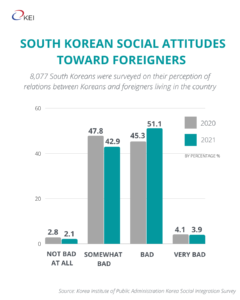The Peninsula
Foreigners Face Discrimination with Little Recourse
Published May 21, 2022
Author: Mai Anna Pressley, Korea View
Category: Current Events, South Korea, Culture

A video on the social media platform TikTok went viral after a popular vlogger was accosted while attempting to film a South Korean club’s anti-foreigner entry sign. The incident spurred conversations on the racism and xenophobia faced by the international community living within Korea, particularly in Seoul. Such occurrences are common, and several similar happenings have been gaining attention on social media recently.
With the overall demographics of the nation changing, foreign-born residents today account for around 3.3% of the total population in Korea. Social attitudes, however, have been slower to change. A social integration survey conducted by the Korea Institute of Public Administration showed that feelings towards foreigners are lukewarm, and the majority of respondents felt that relations between Koreans and the international community are somewhat bad.

Anti-foreigner discrimination pervades many parts of daily life in Korea. The Seoul Metropolitan Government has had to launch a special investigation to crack down on taxi drivers overcharging non-Korean passengers. Many other barriers also exist, including access to financial services. The first online bank to offer services to international residents in the country was only licensed this year. Perhaps the most urgent example was the Korean government’s policy on vaccine passes, which did not recognize overseas vaccinations, preventing access to places like stores or cafes for foreigners who did not get vaccinated in Korea.
There is no legislation against discrimination of race or national origin in Korea. The only recourse foreigners have is to submit complaints to the National Human Rights Commission of Korea.
This briefing comes from Korea View, a weekly newsletter published by the Korea Economic Institute. Korea View aims to cover developments that reveal trends on the Korean Peninsula but receive little attention in the United States. If you would like to sign up, please find the online form here.
Korea View was edited by Yong Kwon with the help of David Lee, Sarah Marshall, and Mai Anna Pressley. Picture from the social media account of Patrick Ramos.
